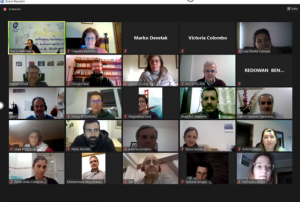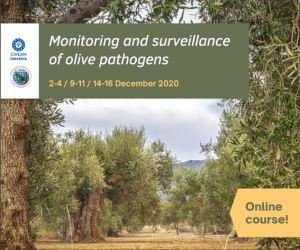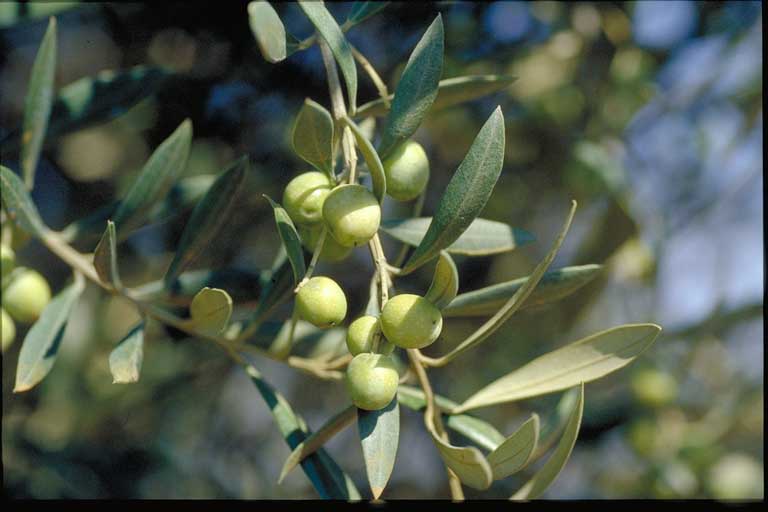 The International Olive Council (IOC) and the Mediterranean Agronomic Institute of Zaragoza (IAMZ) organised an advanced course on Monitoring and Surveillance of Olive Pathogens in live streaming online modality, from 2 to 16 December 2020.
The International Olive Council (IOC) and the Mediterranean Agronomic Institute of Zaragoza (IAMZ) organised an advanced course on Monitoring and Surveillance of Olive Pathogens in live streaming online modality, from 2 to 16 December 2020.
The course was aimed at the competent authorities in the field of plant health certification and inspection, plant protection service professionals, technical advisors and experts from R&D institutions working on disease diagnosis and pathogen prevention and control plans in the olive sector, together with olive germplasm banks’ technicians.
It counted with 50 participants from Albania, Algeria, Argentina, Croatia, Greece, Iran, Italy, Jordan, Lebanon, Morocco, State of Palestine, Portugal, Slovenia, Spain, Tunisia and Turkey.
By participating in this course technicians are expected to:

- Have acquired sound knowledge on the biology, ecology and epidemiology of the main pathogens threatening olive, focusing on Xylella fastidiosa and Verticillium dahliae;
- Have understood the regulatory context and international standards under which the surveillance and monitoring of olive pathogens are performed;
- Be able to identify the relevant parameters for survey design and efficient monitoring with the particular focus on sampling procedures and diagnostics using Xylella fastidiosa and Verticillium dahliae as case studies.
- Be able to prepare and design risk-based surveys and monitoring activities.
- Have networked with professionals and key actors in IOC member countries, exchanged experiences and strengthened cooperation to deal with emerging and re-emerging diseases in olive.
Cours supérieur de Suivi et surveillance des agents pathogènes de l’olivier
Diffusion en direct sur Internet, du 2 au 4, du 9 au 11 et du 14 au 16 décembre 2020
Le Conseil oléicole international (COI) et l’Institut agronomique méditerranéen de Saragosse (IAMZ) ont organisé un cours supérieur consacré au suivi et à la surveillance des agents pathogènes de l’olivier.
Le cours, qui s’est déroulé en visioconférence, était destiné aux autorités responsables de la certification et de l’inspection phytosanitaires, aux professionnels des services phytosanitaires, aux conseillers techniques et aux experts des institutions de R&D travaillant sur le diagnostic des maladies et les plans de prévention et de contrôle des agents pathogènes dans le secteur oléicole, et aux techniciens de banques de germoplasme de l’olivier.
Une cinquantaine de participants venus d’Albanie, d’Algérie, d’Argentine, de Croatie, de Grèce, d’Iran, d’Italie, de Jordanie, du Liban, du Maroc, de l’État de Palestine, du Portugal, de Slovénie, d’Espagne, de Tunisie et de Turquie ont suivi ce cours.
L’objectif de cette formation était de permettre aux techniciens de :
– Acquérir de solides connaissances sur la biologie, l’écologie et l’épidémiologie des principaux agents pathogènes qui menacent l’olivier, en particulier la Xylella fastidiosa et le Verticillium dahliae ;
– Comprendre le contexte réglementaire et les normes internationales régissant la surveillance et le contrôle des agents pathogènes de l’olivier ;
– Être capables d’identifier les paramètres pertinents pour la conception d’enquêtes et un suivi efficace, grâce à l’analyse des procédures d’échantillonnage et des diagnostics à partir d’études de cas sur la Xylella fastidiosa et le Verticillium dahliae ;
– Être capables de préparer et de concevoir des enquêtes et des activités de surveillance basées sur les risques ;
– Travailler en réseau avec des professionnels et des acteurs clés dans les pays membres du COI, échanger des expériences et renforcer la coopération pour faire face aux maladies émergentes et ré émergentes de l’olivier.









